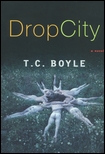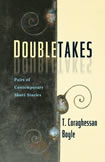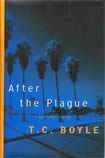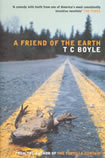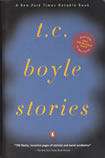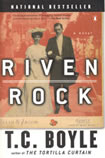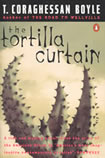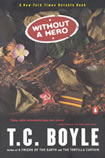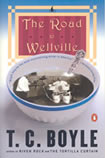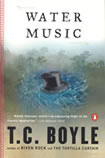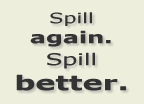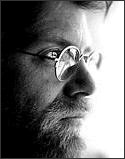|
||||||||
|
|
||||||||||
|
|
T. Coraghessan Boyle
|
||||||||||
| * * |
All right, let's get the shameless plug in for the forthcoming work out of the way, shall we? … "Hey, T.C., we hear that you just handed in a new manuscript to your publisher… What is it? When can we expect to read it? And just how did the idea behind the next book come about?"
Well, I suppose we could be ashamed and give a shameful plug for the new book, but why be ashamed of high art? Even if it is—in all its 388 pages—about sex and nothing but. The Inner Circle, which Viking will release in early September (2004), is a novel built around an invented character who works with Dr. Alfred C. Kinsey in his pioneering sex researches of the 1940s and 1950s. It is funny, heartbreaking, and very, very sexy. How did it come about? Well, if Drop City gives us the concept of Free Love, I suppose I began to wonder where that concept originated and when exactly our society began to loosen up regarding discussion of sex and sexual matters in public. And further: if Kinsey reduced sex to the mechanical, then where does that leave emotion?
As an author of over eight novels and six shorts story collections, the publishing biz must seem old hat to you. How is the biz these days? Does your editor do much editing of your manuscript, or is that relationship more one of professional guidance and advice? As an established author, how much control do you have over the whole process, and how much has this changed over the years?
Let's call it an even ten novels and (already on the slab for 2005, Fall, the next collection) seven collections. As for the publishing business, I have to say how lucky I am to have been with the same house throughout my career (yes, Atlantic-Little, Brown published the first two books but Viking-Penguin quickly acquired rights), so that all my books have always been in print and under the same imprint. From the beginning, my editors have given me absolute free rein—I tend to be difficult and would have it no other way. My current editor—Paul Slovak, at Viking—is a close friend who has worked with me since 1985, first as my publicist and now as my editor. What does he bring? A valued reading of my ms. Our relationship is very simple, really: I love him and he loves me.
Your most recent novel, Drop City, will be out in paperback next month. Much has been made of the plot details concerning the counterculture of the 70s California commune, but the book really seems to be about the concept of utopia, and the characters varied versions and visions thereof. For instance, Norm's idea of "the good life" would be quite different from say, Sess's… That said, what is your idea of utopia?
I like your reading of the book. Most of the press tends to reduce things (BOYLE! HIPPIES! ALASKA!), but yes, I am interested in the concept of going back to nature and the grand American tradition of withdrawing to create one's own utopia. Is it possible, given the current population of the earth, to live off the land, as the hippies dreamed of doing (back in 1970, when there were a mere four billion people extant)? Thus, I see the book as an outgrowth of my environmental novel, A Friend of the Earth (2000). As for me, utopia consists in a place where there is lots of culture and there are lots of people you love, all of whom disappear at the snap of your fingers so you can BROOD ALONE IN THE WILDERNESS, FOR CHRIST'S SAKE!
As one of the five finalists for the National Book Award, you just gave a reading of Drop City here in New York City. Your public readings are well known-as is your prowess in this regard. How much importance do you place on reading in public? As an author, how much of an impact does an entertaining reading have upon the potential reader? And as a reader (and without naming names) has your fondness for a particular writer's work ever been diminished after hearing him or her read?
One of the great loves and joys of my life is to connect with an audience onstage. I see readings as performances, as a way of casting a spell—the spell of literature that takes the audience all the way back to Mommy's lap. But of course I am an extrovert (mostly or at least sometimes) and most writers are not (this is why they became writers in the first place). For those who hate to read and have it forced on them by circumstance, I am sorry, but if you connect to a writer's work that connection will be even stronger for seeing him/her read, no matter how that person delivers onstage.
On the opposite end of the utopian spectrum stands the apocalypse, which is often a subject explored with varying entertainment value, take the popularity of the recent film, 28 Days Later, for instance. Your own version, as displayed in your short story, After the Plague, was quite an interesting take, in that, after all is said and done, humanity is still faced with similar issues of loneliness and love. Can you recall just how exactly the tale of Francis Xavier Halloran III came to pass?
Sure. We are all imminently doomed. That's all we know, the central and telling fact of existence. Forget God. Forget purpose. Forget dignity or even sense. It is over. And if our personal extinction weren't enough, there is always the really crucial knowledge that the sun will shortly (in three billion years or so) go to red giant phase and fry everything here (if the comet doesn't wipe us out first). So, what I'm saying is: what exactly is the point of being here in the first place?
I understand you're hard at work on a new collection of short stories, any particular theme or thread to this new collection? In your opinion, should there be some sort of identity that may help differentiate one short story collection from another?
Ah. And here we must look above, at answer number 2. I have thirteen new pieces and plan to continue with stories for some months yet. There is no unifying theme to this collection, just as there is no unifying them to any of my previous collections, but the themes that have obsessed me from the beginning are certainly present as part of the continuum.
For a man who continues to publish at a remarkable pace, you still find time to teach. In fact, you just released an anthology of fiction, Doubletakes, which presents over 30 stories that you have used in your teaching at USC. You have quite an array of authors here, with a significant emphasis on the contemporaries, such as Saunders, Moore, Bender, and Beattie. What lessons are to be learned by such contemporaries, that can not be taught by the more modern classics like Cheever or Carver?
Tough question. But I do love teaching and these stories (Cheever and Carver are included, by the way) are stories that have had a wide and stirring appeal to my students over the years, so that the book is geared toward people of college age and thereabout—what am I trying to say here? Young people. That's who it's for. We all remember young people, don't we? But these young people need young writers to study, both for inspiration and horror (my God, how did she pull THAT off?). As I often say to my students, you probably wouldn't really tear the world up with your rock and roll band if the last music you heard was by Benny Goodman. You live now, you need to know what artists are doing now?
You've been quite vocal on your lack of interest in genre fiction, not necessarily disliking the works their authors, but rather what you identify as the "the conventionality of the genre." Yet, as a proud graduate of the famed Iowa MFA program and the founder of the creative writing program at USC, you have witnessed the increased popularity of such programs, and the resulting accumulation of annual MFA graduates…As a result, do we not also run the same "conventionality" risk when it comes to what is considered "literary" these days?
A tedious question, my friend. The people who criticize writing programs for producing generic stories have most likely never actually sat in on one. We are artists, professors and students alike, and we have the same artistic goals and problems. Think of it this way: the plastic arts and music have always been incorporated in the university, and now, in recent times, so are the written arts. I want my students to be various and to create as they will—I am their coach, period. I do present models (see Doubletakes), but these are for reference only and the selection is catholic, so as to, I hope, appeal to every type of burgeoning writer.
So…You write seven days a week, seem to put out a new book every other year, publish short stories with amazing frequently, teach every semester, maintain your own web site (www.tcboyle.com), communicate with numerous fans, and even humor humble interview requests like this….Thus, our final question: when do you find time to be…just T.C.? We don't want to discourage your productivity but, my god man, haven't you ever wanted to call TIME OUT and go into hiding for a little while? If so, where would you go?
Actually, I'd say that's every eighteen months, as least in the past decade or so. Why? Because (and please zip to tcboyle.com and read my essay under About the Author, called "This Monkey, My Back"), making art is an obsessive/compulsive disorder and it gives you (on completion) the same sort of rush as a needful drug does. And yes, I am increasingly busy—touring takes a huge chunk out of my life—but as I say, I love the stage and I am enchanted by spreading the word, but when I need time alone—time to pursue the next project—I do tend to disappear. I try to remind myself, despite the pressures of publicity, that the work is all that matters. This is what it's all about, trying to bring form and beauty to the chaos that surrounds us. I'd go mad without it (and maybe I'll go mad with it and from it). Anyway, you won't see much of me after the tour for The Inner Circle—I'll be cranking away, up in the mountains, bearded, gibbering and (I fervently hope) fully Wordsworthian.
© failbetter.com

